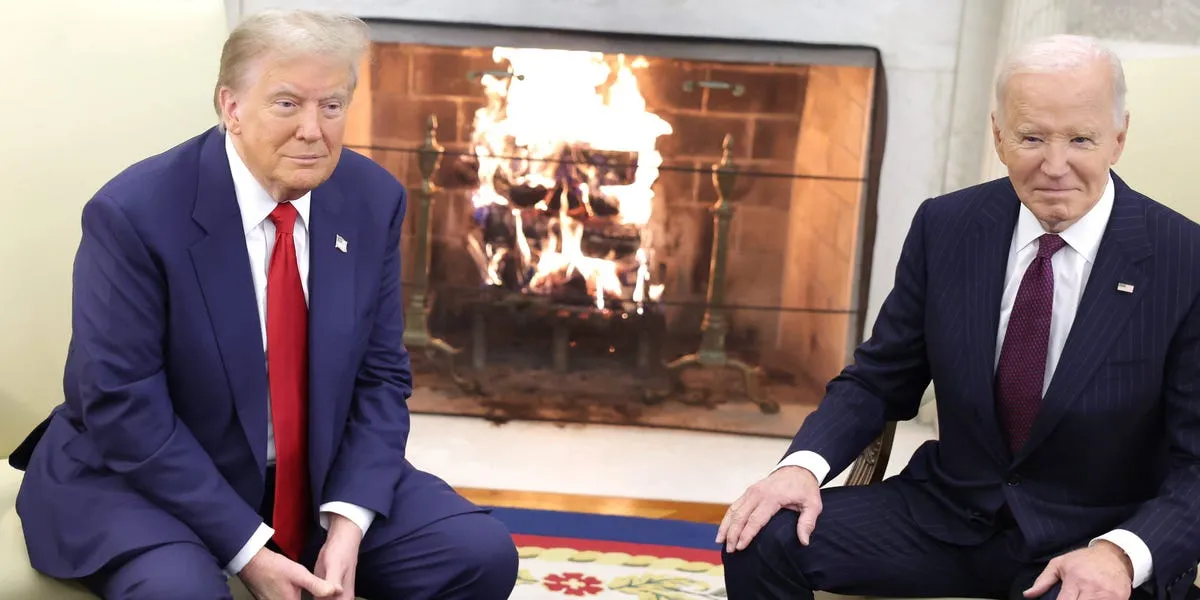
The economic landscape under Trump's administration has raised alarm bells among investors, with increasing fears of a recession and a notable drop in the stock market. Recent corrections in the S&P 500 index have brought investor concerns to the forefront, reflecting discontent with Trump's economic policies. As the 2026 midterm elections loom closer, Trump may be jeopardizing his political future by dismissing the growing unease surrounding the economy.
President Donald Trump could be repeating the mistakes that cost the Democrats the election last year. Much like President Joe Biden's insistence on a robust economy while high inflation plagued American households, the Trump administration seems to be overlooking the deteriorating economic sentiment. Inflation emerged as a critical issue for voters, and Biden's team faced criticism for downplaying its impact. Regardless of whether Biden's administration is primarily responsible for the inflation spike, voters perceived a disconnection between the narrative of economic strength and the reality of escalating living costs.
In the early months of Trump's presidency, the economy has encountered significant challenges, including a declining stock market and a drop in consumer and investor sentiment. This has sparked fears of a possible recession, yet the administration has largely ignored or dismissed the pain felt by the populace due to the uncertainty surrounding Trump's policies. According to Mark Zandi, chief economist at Moody's, sentiment is indeed faltering. "You can see that in business surveys, in consumer surveys, and, of course, the stock market," Zandi commented.
The S&P 500 recently entered a correction phase, falling 10% from its February 19 peak, marking the first significant downturn since October 2023. Despite this alarming trend, Treasury Secretary Scott Bessent has attempted to downplay the situation, claiming that corrections are a normal aspect of market health while the administration remains focused on its long-term goals.
Trump continues to assert that tariffs are an economic boon, even as concerns grow among markets and consumers regarding their effects. A declining stock market could significantly hamper the economy if it fails to recover swiftly. Zandi notes that the current economic climate bears stark contrasts to the early days of the Biden administration, where inflation was already a past issue. "This time around, the administration risks a vibecession turning into an actual recession," he warned.
Zandi emphasized the importance of stock market performance on the broader economy, stating that consumer spending—especially among affluent individuals—is crucial. If the stock market remains in decline, the affluent are likely to curtail their spending, which could trigger a more extensive economic downturn.
This week, RBC strategist Lori Calvasina adjusted her year-end S&P 500 price target from 6,600 to 6,200, citing evidence of weak investor sentiment. In her recent analysis, she highlighted the lack of clear buying opportunities in the stock market as sentiment dips among investors, consumers, and businesses alike. "It's a tricky moment in the US equity market," Calvasina remarked, noting that there is no clear signal indicating whether a contrarian buying opportunity exists despite the S&P 500's 10% drop from its all-time highs.
Similarly, economist Ed Yardeni reduced his optimistic year-end S&P 500 price target from 7,000 to 6,400, attributing the decline to increased economic uncertainty. Strategists at Goldman Sachs have also lowered their target to 6,200 from 6,500, reflecting rising political uncertainties surrounding tariffs and their potential impact on broader economic growth. Recently, Goldman Sachs increased its recession probability from 15% to 20%.
Data is increasingly showing that consumers and businesses are feeling the strain. A growing number of households report insufficient savings for emergencies, while many public companies highlight policy uncertainty clouding their outlook for 2025. The upcoming date of April 2 is pivotal for investors, as Trump has indicated intentions to impose reciprocal tariffs, a move that could exacerbate economic issues. Zandi warns that if these tariffs are enacted, America’s tariff rate could reach levels not seen since the 1930s, potentially triggering retaliatory actions from trading partners and leading to a recession.
However, if a trade deal is reached that avoids a full-blown trade war, it could alleviate some of the uncertainty plaguing the markets. Zandi suggests that Trump is adept at pivoting when necessary, noting, "If push comes to shove, he'll pivot, and you got to give him credit." The political stakes are high; a recession could jeopardize Republican control in both the House and Senate during the critical 2026 midterm elections. Ultimately, ignoring the darkening economic sentiment could pose significant risks for Trump's administration, both economically and politically.